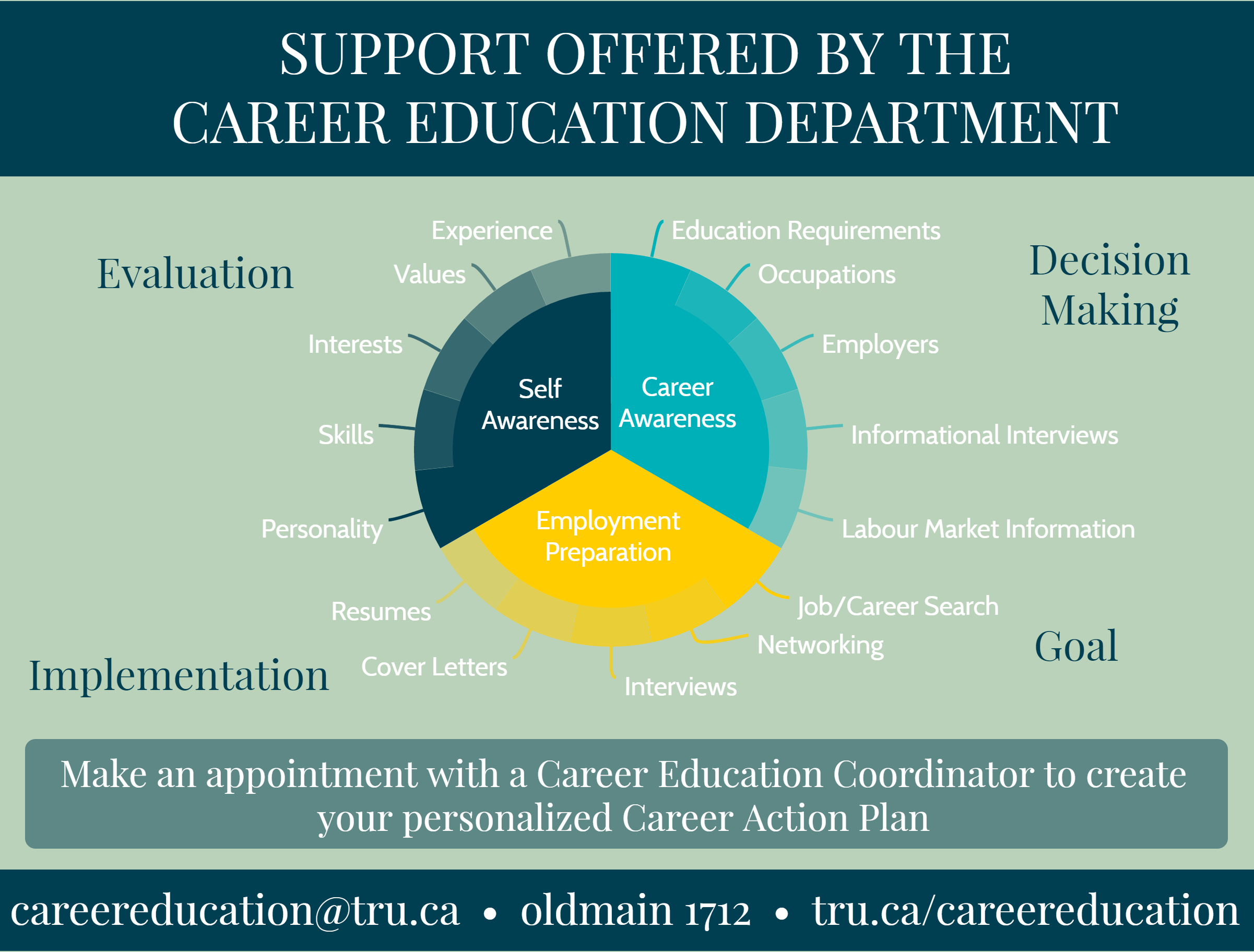Career Development
Get the skills, documents and confidence you need to succeed. We help you build resumés, cover letters and portfolios — and provide free one-on-one career development support. Below you will find information on various career development topics, and what possible outcomes from meeting with us could be. If you want to meet with us just book a meeting through Career Connections.
Career Planning
- Developing or changing a career path
- Exploring career or educational options
- Building confidence in career development
- Learning career development skills
- Skill assessment
Outcomes:
- By the end of the appointment, students will be able to clarify their current career goal.
- By the end of the appointment, students will be able to identify short term goals to achieve their current career goal.
- By the end of the appointment, students will be able to reflect on their current transferable, technical, and career development skills.
Resume and Cover Letter Review
- Improvement on current resume or cover letter
- Learning how to write a resume or cover letter
Outcomes:
- By the end of the appointment, students will be able to summarize the purpose, structure, and audience of a resume or cover letter.
- By the end of the appointment, students will be able to design a resume or cover letter for a specific audience that follows appropriate conventions.
Interview Practice
- Practicing interview skills
- Learning what to expect from an interview
- Exploring how to answer different interview questions
Outcomes:
- By the end of the appointment, students will be able to respond to frequently asked interview questions.
- By the end of the appointment, students will be able to reflect on their own interview skills and what they need to improve.
Job Search Coaching
- Learning job search tools
- Exploring job opportunities on campus
- Learning tools for finding labour market information
Outcomes:
- By the end of the appointment, students will be able to select an appropriate job search tool for their current and active job search.
- By the end of the appointment, students will be able to design a plan for their current and active job search.
- By the end of the appointment, students will be able to identify and use sources of labour market information relevant to their field.
Personal Assessment
Think about your own abilities and skills, and how they can be applied to a position you are interested in.
- What are your career goals?
- What is your immediate job objective?
- What special skills do you have that will help you succeed?
- Why are you interested in the career or industry you have chosen?
- What are your special strengths, and how do these apply in a work environment?
- What experiences have you had that are relevant to your career goals and position you are seeking?
Answering these questions can help you develop a better understanding of what you can offer an organization and the position most suitable for your skills and interests.
Informational Interviews
Informational interviews are extremely valuable opportunities to tap into the hidden job market, learn more about your industry and employer of choice!
Advantages of conducting an informational interview
- Understand the realities of employment
- Learn more about career field and skills needed to succeed
- Determine where you might fit into a particular organization
- Make personal connection with those in your desired industry
- Gain confidence in talking with people while learning from them
- Expose yourself to a variety of jobs and personalities in different organizations
- Because this is not a job interview, you can control interview by deciding questions
Arranging informational interviews
- Contact person to set up interview by:
- Telephone
- Cold calling
- Email followed by telephone
- Having someone who knows the person make appointment for you
- Introducing yourself at a networking event (Job Fair, Employer presentation, etc.)
- Suggest time and place that suits work schedule and nearby employer location
Before informational interview
- Research company / organization
- Prepare interview questions in advance
- Update resume and bring with you – use this to share your experiences, education, skills and abilities. You may also want feedback on your resume.
After informational interview
At the end of the conversation, thank person for taking time to meet and offering advice and career information. Consider following up time to time with update on work-search progress.
Labour Market Research
Ask yourself, “What skills and qualifications are employers looking for?”, and use your answer to better understand where you can excel in the market.
Some great ways to conduct your research:
- Search online materials for new developments in your industry
- Job shadowing industry professionals at their place of employment
- Conduct informational interviews with professionals in your area of interest
- Gain experience through work, especially through Co-op and volunteer opportunities
Search job postings and carefully review job descriptions to better understand what employers are seeking. The Canadian Job Bank is a great tool for searching job market trends, finding jobs and employers, and exploring career options. Check out the video below for how to research your industry.
Predictions on job openings for 140 occupationsCareer Action Plan
Our career experts can meet with you one-on-one and build a personalized career action plan. Your action plan will show proven job search strategies, connecting current opportunities with future possibilities, preparation for informational interview, and many more helpful tips from our expert coordinators.

Online Career Development Resources
TypeFocus is an online career assessment resource that includes a personality assessment (Myers Briggs Type Indicator), interests assessment (Holland's RAISEC), values assessments (Work Values), and Success Factors. It also includes exploration and goal setting sections where you can look at various occupations and career clusters. For access to this resource please contact careereducation@tru.ca.
